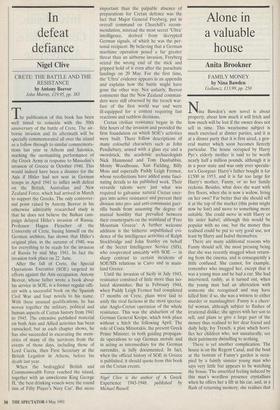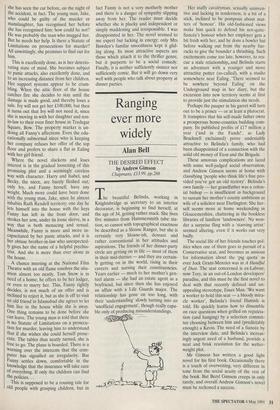Alone in a valuable house
Anita Brookner
FAMILY MONEY by Nina Bawden Gollancz, £13.99, pp. 250 ma Bawden's new novel is about property, about how much it will fetch and how much will be lost if the owner does not sell in time. This wearisome subject is much exercised at dinner parties, and it is at a dinner party that it is first aired, a gen- eral matter which soon becomes fiercely particular. The house occupied by Harry Pye's elderly mother is said to be worth nearly half a million pounds, although it is in a poor state and was only ever specula- tor's Georgian: Harry's father bought it for £1500 in 1953, and it is far too large for Harry's mother, Fanny, or so her family reckons. Besides, what does she want with five floors, when she is now a widow, living on her own? Far better that she should sell it at the top of the market (this point might now be lost) and move to something more suitable. She could move in with Harry or his sister Isabel, although this would be popular with no one, but the money thus realised could be put to very good use, not least by Harry and Isabel themselves.
There are many additional reasons why Fanny should sell, the most pressing being that she was recently mugged when return- ing from the cinema, and is consequently a little confused. She cannot, for example, remember who mugged her, except that it was a young man and he had a car. She had intervened, rashly, as it turned out, when the young man had an altercation with someone she recognised and may have killed him: if so, she was a witness to either murder or manslaughter. Fanny is a cheer- ful woman, although subject to flashes of irrational dislike; she agrees with her son to sell, and plans to give a large part of the money thus realised to her dear friend and daily help, Ivy Trench, a plan which horri- fies her children who, not unnaturally, see their patrimony dwindling to nothing.
There is yet another complication. The house is on the Regent Canal, and the boat at the bottom of Fanny's garden is occu- pied by a faintly sinister young man who says very little but appears to be watching the house. The unsettled feeling induced by this man's wordless presence crystallises when he offers her a lift in his car, and, in a flash of returning memory, she realises that she has seen the car before, on the night of the accident, in fact. The young man, Jake, Who could be guilty of the murder or manslaughter, has recognised her before she has recognised him: how could he not? He was probably the man who mugged her. But he needs her help. Is there a Statute of Limitations on prosecutions for murder? All unwittingly, she promises to find out for him.
This is excellently done, as is her deterio- rating state of mind. She becomes subject to panic attacks, also excellently done, and to an increasing distance from her children. Her support systems appear to be crum- bling. When the attic floor of the house catches fire she decides to stay until the damage is made good, and thereby loses a sale. Ivy will not get her £100,000, but then it turns out that Ivy will not need it, since she is moving in with her daughter and son- in-law to their even finer house in Tredegar Square, Bow. The property market is un- doing all Fanny's affections. Even the edu- cationally subnormal niece who is keeping her company refuses her offer of the top floor and prefers to share a flat in Ealing With her girl friend.
Where the novel slackens and loses interest is in the gradual loosening of this Promising plot and a seemingly careless way with character. Harry and Isabel, and Becky, the niece, are barely fleshed out, only Ivy, and Fanny herself, have any weight. Much more could have been done With the young man, Jake, since he almost inhabits Ruth Rendell territory; one day he lets himself into the house with the keys Fanny has left in the front door, and strokes her arm, under its loose sleeve, in a way that is both menacing and sexual. Meanwhile, Fanny is more and more in- capacitated by her panic attacks, and it is her obtuse brother-in-law who unexpected- ly gives her the name of a helpful psychia- trist. And she is more than ever alone in the house.
A chance meeting at the National Film Theatre with an old flame resolves the situ- ation almost too neatly. Tom Snow is in need of a home; he offers to be her lodger, or even to many her. This, Fanny rightly decides, is not much of an offer and is inclined to reject it, but as she is off to visit an old friend in Islamabad she agrees to let him live in the house while she is away. One thing remains to be done before she can leave. The young man is told that there is no Statute of Limitations on a prosecu- tion for murder, leaving him to understand that if she wishes she could herself prose- cute. The tables thus neatly turned, she is free to go. The plane is boarded. There is a warning over the intercom that the com- Puter has signalled an irregularity. But Fanny settles down, comfortable in the knowledge that the insurance will take care of everything. If only the children can find the policies...
This is supposed to be a rousing tale for Old people with grasping children, but in fact Fanny is not a very motherly mother and there is a danger of sympathy slipping away from her. The reader must decide whether she is plucky and independent or simply maddening and irresponsible. I was disappointed in her. The novel seemed to me expert but lacking in energy; only Mrs Bawden's familar smoothness kept it glid- ing along. Its most attractive aspects are those which attach it to the thriller genre, but it purports to be a social comedy. Finally, it is neither sufficiently sinister nor sufficiently comic. But it will go down very well with people who talk about property at dinner parties.



















































 Previous page
Previous page